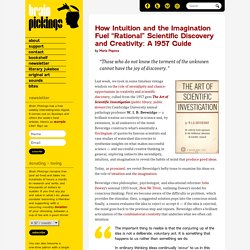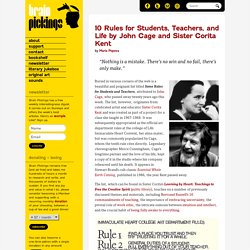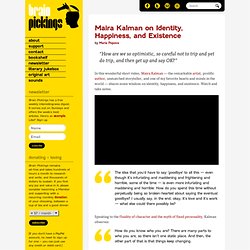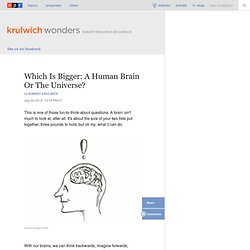

Henry Miller on Reading, Influence, and What's Wrong with Education. The Role of Intuition and Imagination in Scientific Discovery and Creativity: A 1957 Guide. By Maria Popova “Those who do not know the torment of the unknown cannot have the joy of discovery.”

Last week, we took in some timeless vintage wisdom on the role of serendipity and chance-opportunism in creativity and scientific discovery, culled from the 1957 gem The Art of Scientific Investigation (public library; public domain) by Cambridge University animal pathology professor W. I. B. Beveridge — a brilliant treatise on creativity in science and, by extension, in all endeavors of the mind. Today, as promised, we revisit Beveridge’s hefty tome to examine his ideas on the role of intuition and the imagination. The important thing to realize is that the conjuring up of the idea is not a deliberate, voluntary act. In allowing for these magic moments to occur, Beveridge stresses the importance of embracing uncertainty and doubt: He once again quotes Dewey, who advocated what he called “reflective thinking”: It is not possible deliberately to create ideas or to control their creation.
A Liberal Decalogue: Bertrand Russell's 10 Commandments of Teaching. 10 Rules for Students and Teachers (and Life) by John Cage and Sister Corita Kent. By Maria Popova “Nothing is a mistake.

There’s no win and no fail, there’s only make.” Buried in various corners of the web is a beautiful and poignant list titled Some Rules for Students and Teachers, attributed to John Cage, who passed away twenty years ago this week. The list, however, originates from celebrated artist and educator Sister Corita Kent and was created as part of a project for a class she taught in 1967-1968. It was subsequently appropriated as the official art department rules at the college of LA’s Immaculate Heart Convent, her alma mater, but was commonly popularized by Cage, whom the tenth rule cites directly. RULE ONE: Find a place you trust, and then try trusting it for awhile.RULE TWO: General duties of a student — pull everything out of your teacher; pull everything out of your fellow students.RULE THREE: General duties of a teacher — pull everything out of your students. Donating = Loving Bringing you (ad-free) Brain Pickings takes hundreds of hours each month.
Maira Kalman on Identity, Happiness, and Existence. By Maria Popova “How are we so optimistic, so careful not to trip and yet do trip, and then get up and say OK?”

In this wonderful short video, Maira Kalman — the remarkable artist, prolific author, unmatched storyteller, and one of my favorite hearts and minds in the world — shares some wisdom on identity, happiness, and existence. Watch and take notes. The idea that you’d have to say ‘goodbye’ to all this — even though it’s infuriating and maddening and frightening and horrible, some of the time — is even more infuriating and maddening and horrible: How do you spend this time without perpetually being so broken-hearted about saying the eventual goodbye? I usually say, in the end, okay, it’s love and it’s work — what else could there possibly be? Speaking to the fluidity of character and the myth of fixed personality, Kalman observes: How do you know who you are? Here are some of the beautiful, poignant quotes Kalman reads and shows from her published works.
How do you know who you are?
Which Is Bigger: A Human Brain Or The Universe? : Krulwich Wonders... This is one of those fun-to-think-about questions.

A brain isn't much to look at, after all. It's about the size of your two fists put together, three pounds to hold, but oh my, what it can do. Robert Krulwich/NPR With our brains, we can think backwards, imagine forwards, conjure, create things that don't exist, leap vast distances. For example, suppose I say to you, close your eyes and imagine this: ...let's you and I rocket off the Earth and keep going, out past Neptune, then past the nearest star, then on and on across a patch of cold empty space until we reach an interstellar gas cloud glowing pale blue, and when we get there, let's fly to the top, hover near a small baby star softly glowing, and move in closer to see it peeking out from the top of the cloud...